Introduction
What Sweetener Is Best for Matcha? Matcha, with its unique taste and health benefits, has gained popularity, but finding the right sweetener can be tricky. The goal is to enhance matcha’s delicate, earthy flavor without overpowering it, while also reducing bitterness.
In this guide, we’ll explore sweeteners that pair perfectly with matcha, from natural options to low-calorie alternatives. We’ll also share tips to help you craft the perfect matcha that fits your taste. Let’s dive in!
Overview of Matcha and Sweeteners
What is Matcha?
Matcha isn’t your regular tea. It’s a fine powder made from shaded green tea leaves, boosting its chlorophyll content. This process gives matcha its bright green color and packs it with antioxidants and nutrients. Unlike regular tea, matcha is whisked into water or milk. You consume the whole leaf, gaining all its health benefits.
Matcha is rich in catechins, a powerful antioxidant. It can boost metabolism, increase energy, and improve brain function. However, many find matcha’s bitterness hard to enjoy. Sweeteners help balance this natural taste, making your matcha smoother and more enjoyable to drink.
Why Sweeteners Are Used in Matcha
Sweeteners make matcha more enjoyable by reducing its natural bitterness. Matcha’s umami flavor is satisfying for many but can feel too strong for some. Adding a little sweetness helps make it appealing to a wider audience.
Not all sweeteners are the same. The best ones enhance matcha’s earthy, grassy notes without overpowering them. A drizzle of honey or maple syrup adds a gentle sweetness that balances the flavor. In contrast, artificial sweeteners may disrupt the harmony.
Choosing the right sweetener depends on your taste, health needs, and the type of matcha you use. Ceremonial-grade matcha, with its delicate flavor, needs a light touch. Culinary-grade matcha, used in lattes or smoothies, works well with bolder sweeteners.
Why Choosing the Right Sweetener Matters for Matcha
Selecting the perfect sweetener for your matcha isn’t just about taste—it’s about health too. Some sweeteners, like raw honey or maple syrup, come packed with antioxidants and other beneficial compounds. Others, such as stevia or monk fruit, offer the advantage of being zero-calorie alternatives, which can be a game-changer for those watching their weight or blood sugar.
But it’s not just about health benefits. The sweetener you choose will influence the overall drinking experience—from how it dissolves in your cup to how it interacts with the texture of the matcha. For example, a rich, creamy coconut sugar can add a velvety texture to your matcha latte, while a light agave syrup might blend seamlessly without altering the consistency.
Understanding the nuances of each sweetener is key. While some may work wonders for certain matcha preparations, others might be better suited for specific flavor profiles or health goals. Ultimately, the goal is to strike the perfect balance—sweet enough to bring out matcha’s complex flavors, but not overpowering.
So, what’s the best sweetener for matcha? The answer depends on your needs, preferences, and health considerations. Let’s delve deeper into the different types of sweeteners and how they pair with matcha in the next section.
Different Types of Sweeteners for Matcha
When it comes to sweetening matcha, the right sweetener can elevate your experience, enhancing both the flavor and health benefits. Whether you prefer natural alternatives or more conventional sugar substitutes, there are several options to explore. In this section, we’ll dive into both natural and artificial sweeteners that can make your cup of matcha more enjoyable, while maintaining its delicate balance.
Natural Sweeteners for Matcha
Honey
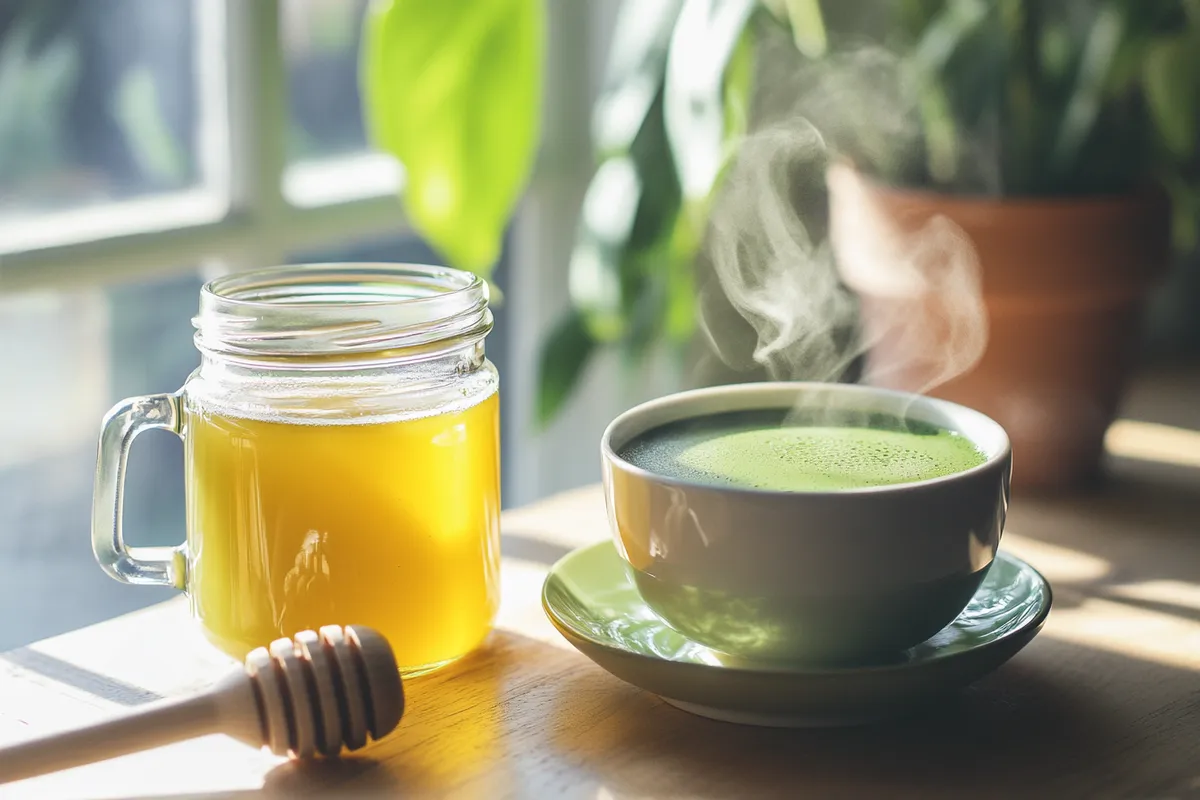
One of the most beloved natural sweeteners, honey is a wonderful addition to matcha. Its rich, golden sweetness complements the earthy, slightly bitter taste of matcha without overpowering it. Raw honey, especially, is packed with antioxidants that promote overall health, making it not only a flavorful addition but a nutritious one as well.
The subtle floral notes of honey bring out the smoother qualities of matcha, creating a well-rounded flavor profile that many tea enthusiasts adore. While honey is sweet, it doesn’t mask the complex flavor of the matcha; rather, it enhances its natural taste. Plus, honey has natural sugars that the body can process efficiently, providing a gentle energy boost without causing spikes in blood sugar.
Maple Syrup
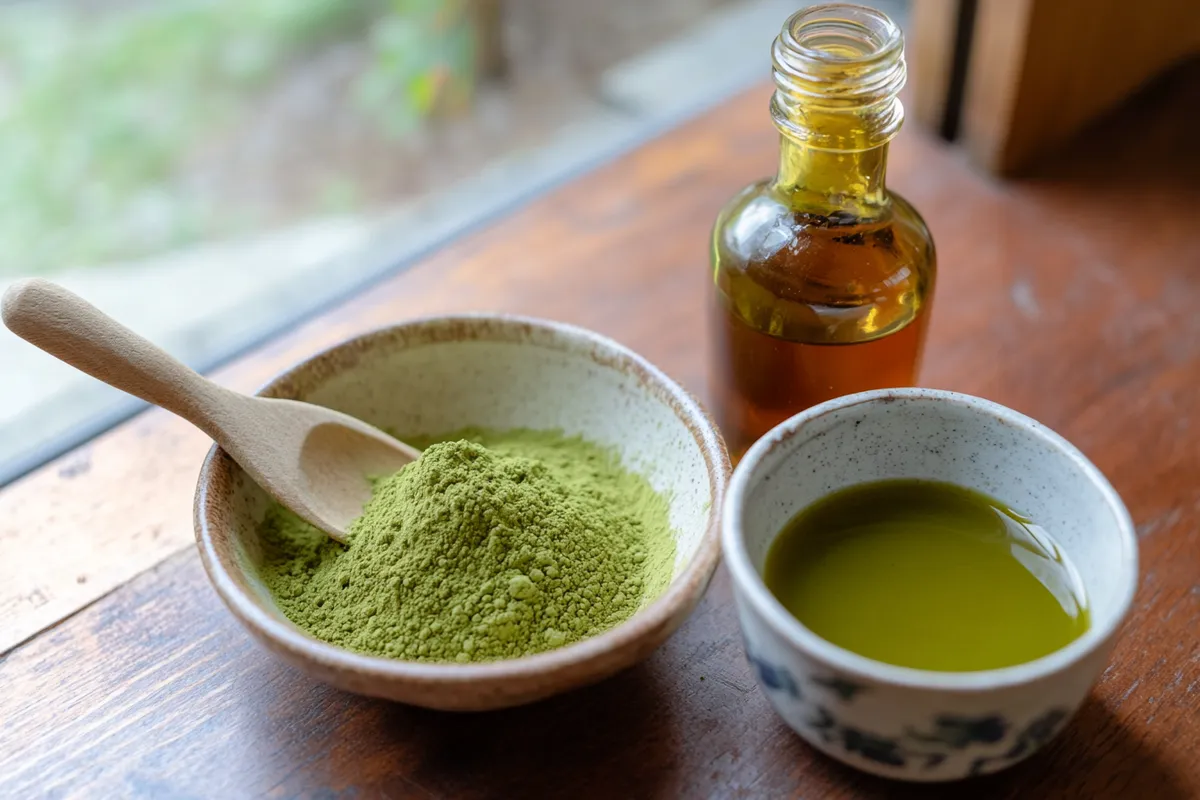
Another fantastic natural sweetener for matcha is maple syrup. This amber liquid, derived from maple trees, is known for its rich, earthy flavor that pairs beautifully with matcha’s grassy notes. Pure maple syrup adds a complex sweetness that complements matcha’s savory depth, creating a harmonious balance between sweetness and bitterness.
Beyond its flavor, maple syrup is also a source of essential minerals, like manganese and zinc, and has a lower glycemic index compared to regular sugar. This makes it a popular choice for those looking for a natural alternative that also offers health benefits. The depth of flavor that maple syrup provides makes it an excellent choice for matcha lattes or iced matcha beverages.
Stevia
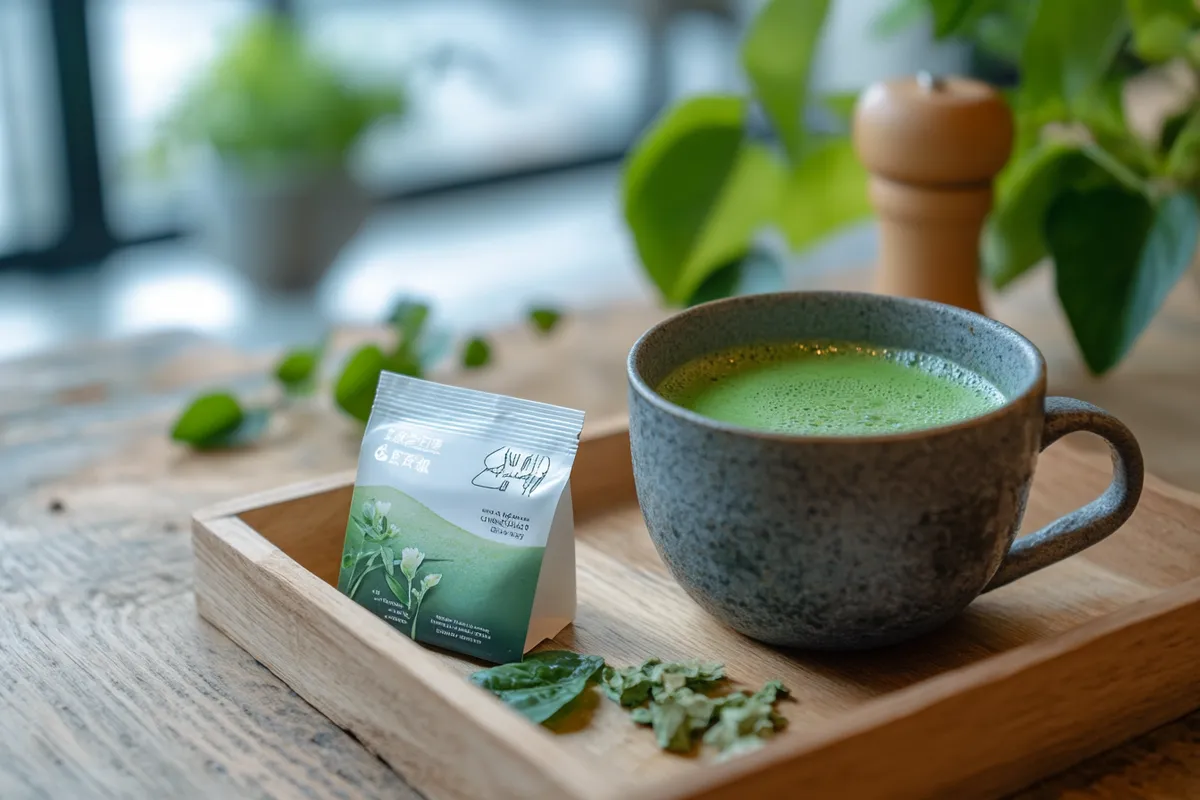
If you’re seeking a zero-calorie sweetener for your matcha, stevia is a go-to choice. Derived from the leaves of the Stevia rebaudiana plant, stevia extract is much sweeter than sugar, but contains no calories, making it an ideal option for those watching their waistline or managing their blood sugar levels.
Stevia’s sweetness is pure and clean, without the aftertaste that some artificial sweeteners can leave behind. It’s a great way to enjoy matcha without any guilt, and it can seamlessly blend into both hot and cold beverages. For health-conscious individuals, stevia serves as a sugar alternative that doesn’t compromise on flavor.
Agave Syrup
Agave syrup (also known as agave nectar) is another plant-based sweetener that works well with matcha. It’s sweeter than honey and maple syrup, and it dissolves easily in both hot and cold liquids. What makes agave particularly attractive is its low glycemic index, meaning it causes a slower rise in blood sugar levels, making it a good choice for people with diabetes or those trying to manage their blood sugar.
Agave nectar has a mild, neutral flavor that blends effortlessly with matcha, enhancing its taste without overshadowing it. For those who prefer a sweeter option but don’t want the spikes in blood sugar associated with traditional sugar, agave syrup is a smart alternative.
Coconut Sugar
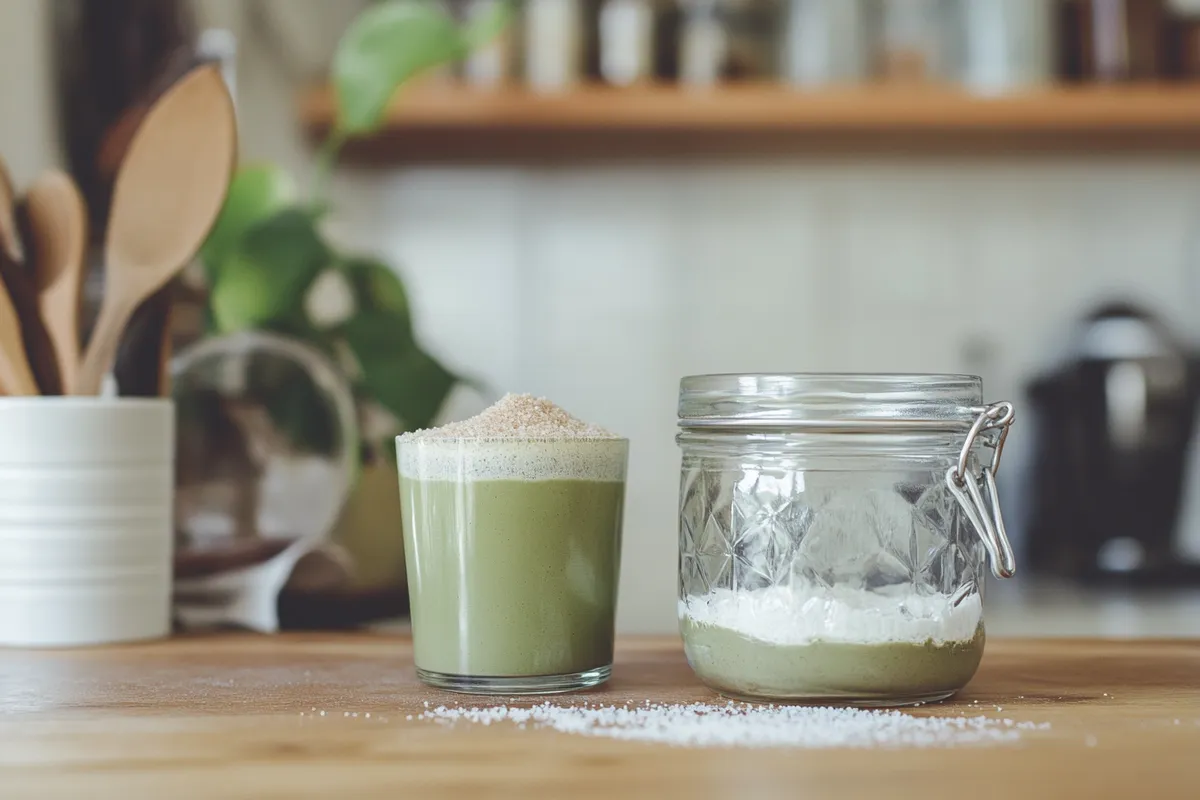
If you’re seeking a low glycemic sweetener that adds a rich, caramel-like flavor to your matcha, then coconut sugar is a fantastic choice. Derived from the sap of coconut palms, coconut sugar is minimally processed and retains many of the nutrients found in the coconut, including iron, zinc, and potassium.
With its low glycemic index, coconut sugar is a great choice for individuals looking for a sustainable sweetener. It enhances matcha’s flavor with its natural richness and slightly molasses-like taste, making it a popular option for matcha lattes and smoothies. Not only is it great for your cup of matcha, but it’s also an eco-friendly, sustainable choice that appeals to those with environmental concerns.
Artificial Sweeteners for Matcha
While many natural sweeteners are a go-to for matcha enthusiasts, artificial sweeteners are also a widely used option. Though they may lack some of the health benefits of natural alternatives, they offer calorie-free sweetness and are often used in low-calorie or sugar-free matcha beverages.
Aspartame and Sucralose
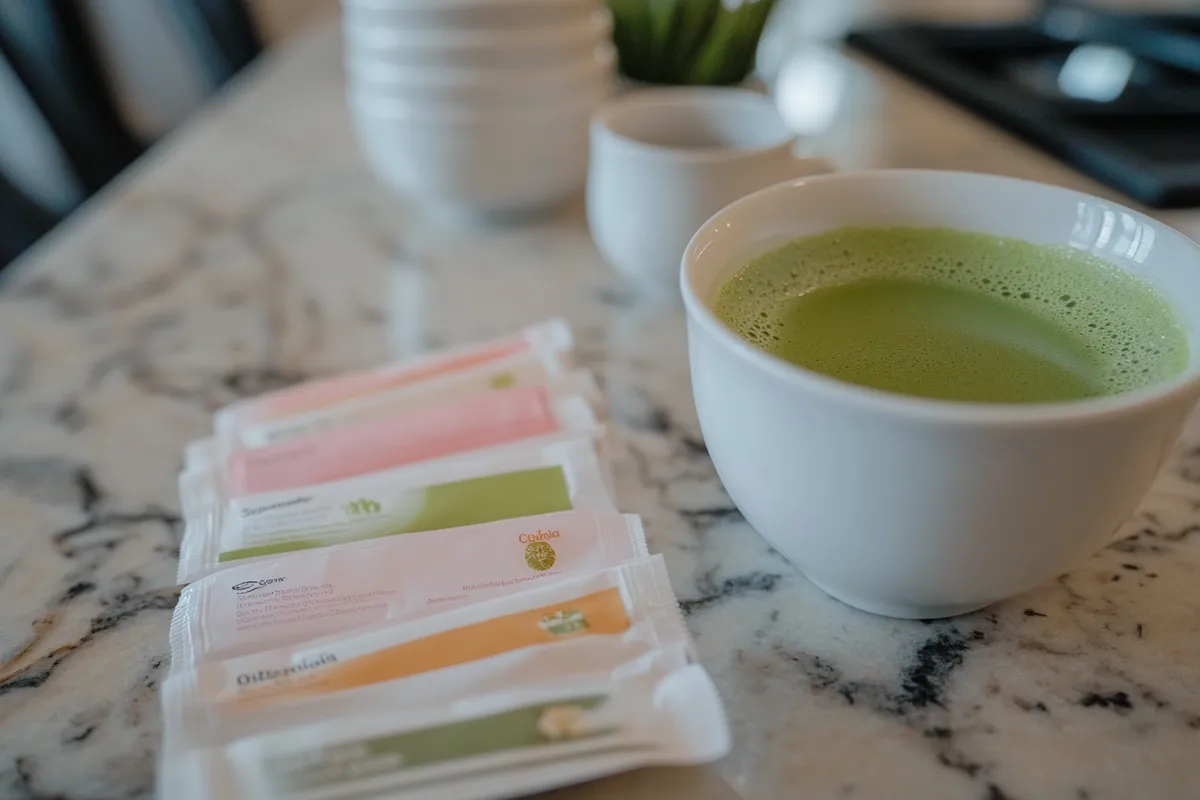
Artificial sweeteners like aspartame and sucralose are common in sugar-free products, including matcha lattes and pre-packaged matcha beverages. These sweeteners provide the sweetness of sugar without the added calories. However, they can sometimes leave a lingering aftertaste, which may not appeal to everyone. Additionally, there are ongoing debates about their long-term health effects, with some studies raising concerns about their impact on metabolism and gut health.
Despite these concerns, aspartame and sucralose remain popular because they are widely available, inexpensive, and provide sugar-free sweetness in matcha drinks. If you’re looking for a quick, convenient way to sweeten your matcha without the extra calories, these artificial sweeteners may be an option to consider.
Monk Fruit
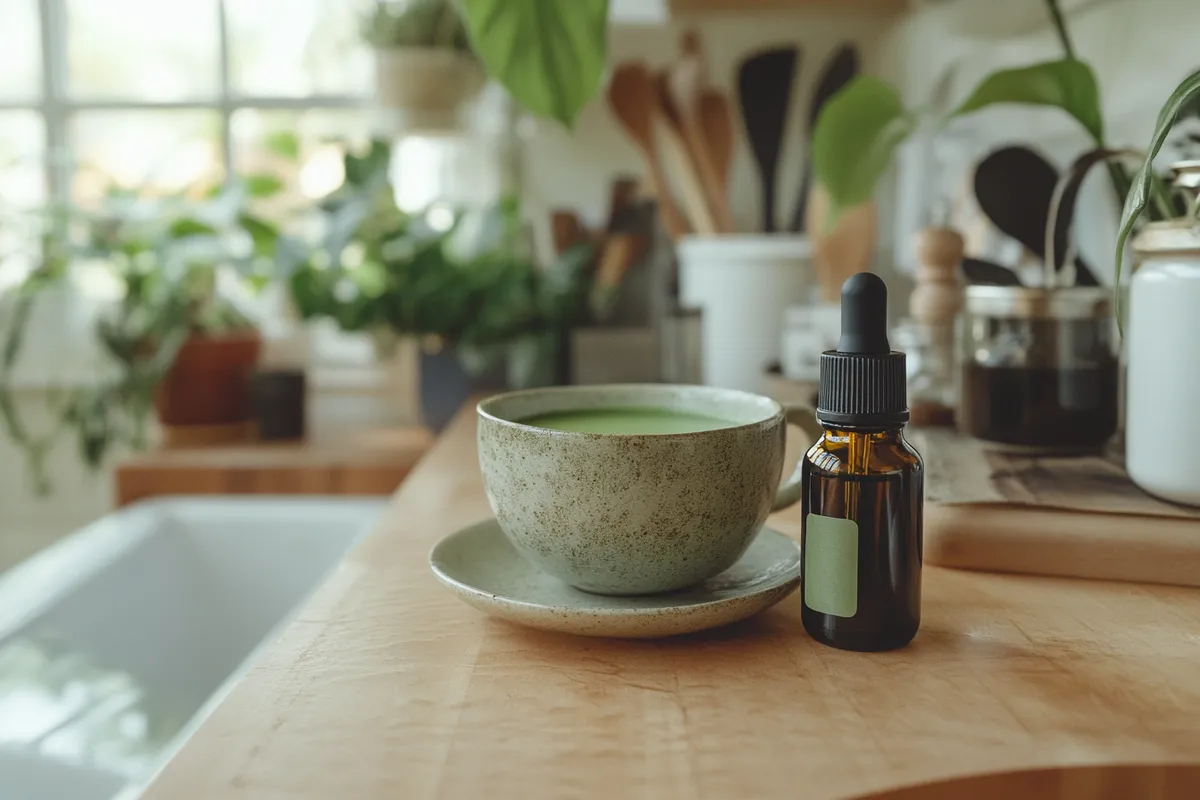
Monk fruit extract is quickly gaining popularity as a calorie-free, natural sweetener that pairs well with matcha. Derived from the monk fruit, a small green gourd native to Southeast Asia, monk fruit extract is far sweeter than sugar, but without the calories. It doesn’t raise blood sugar levels, making it an excellent option for those with dietary restrictions like keto or diabetes.
Monk fruit provides a clean, natural sweetness, without the bitter aftertaste sometimes associated with stevia. It’s an ideal choice for those who prefer a natural sweetener but don’t want the calories of traditional sugar. Given its growing popularity, it’s becoming a common choice in health-conscious matcha beverages.
Other Alternatives: Sugar Alcohols and More
For those looking for additional low-calorie options, sugar alcohols can also be a suitable choice for matcha. These alternatives offer sweetness with fewer calories than regular sugar, without the aftertaste of artificial sweeteners.
Erythritol
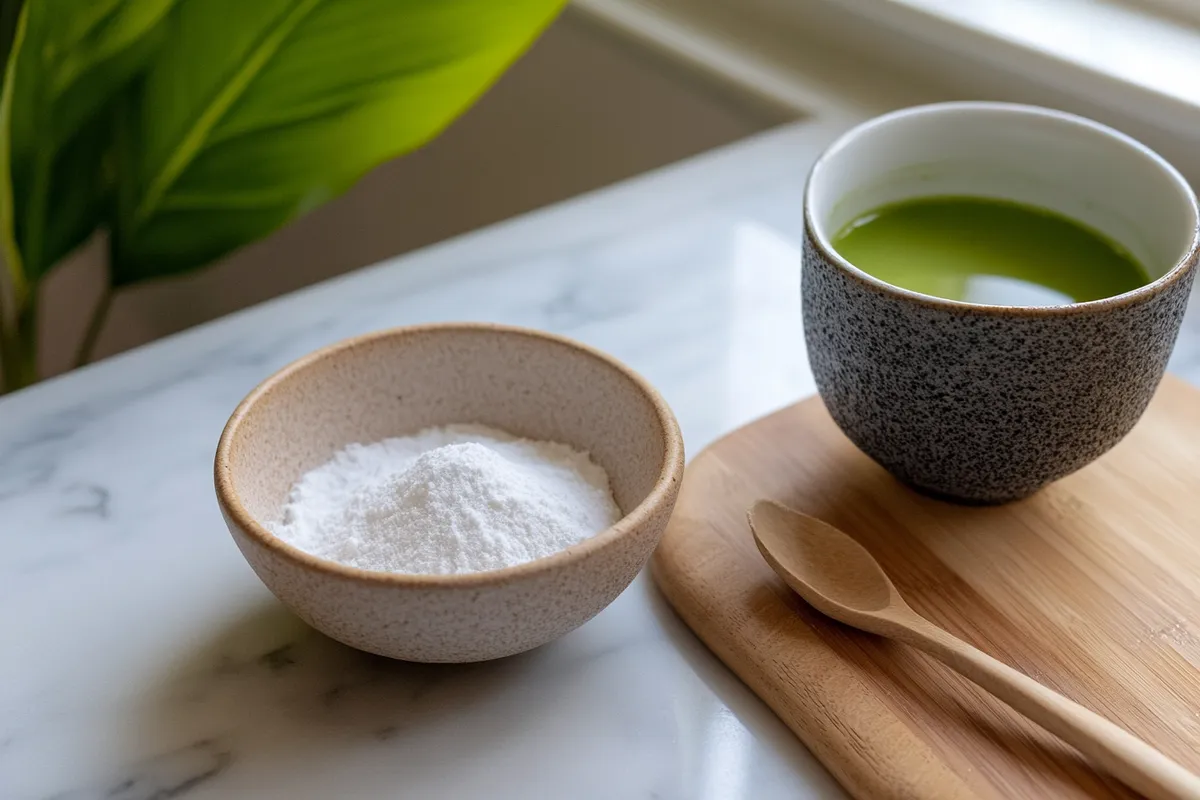
It is a sugar alcohol that is commonly used in low-calorie and sugar-free products. It contains about 70% of the sweetness of sugar but has only a fraction of the calories. Erythritol doesn’t cause blood sugar spikes, making it a great option for those watching their glucose levels. It blends well with matcha, especially in matcha lattes or smoothies, where a smooth, mild sweetness is desired without the added calories.
Xylitol
Another popular sugar alcohol is xylitol, which is often used in dental products for its benefits to oral health. Unlike regular sugar, xylitol helps prevent tooth decay and promotes healthy teeth. It’s about as sweet as sugar, but with fewer calories, making it a good option for those concerned about their weight or calorie intake.
In terms of flavor, xylitol has a mild sweetness that works well with matcha, offering a subtle, balanced taste without being overpowering. Like erythritol, xylitol is low-calorie and won’t spike blood sugar, making it a smart choice for health-conscious individuals.
From honey’s natural sweetness to the zero-calorie options like monk fruit and stevia, there’s a sweetener out there for every type of matcha lover. Whether you prioritize flavor, health, or calorie count, the sweetener you choose can elevate your matcha experience and ensure you enjoy it just the way you like it.
Health Benefits of Sweeteners in Matcha
The sweetener you choose for your matcha doesn’t just impact flavor; it can also provide a range of health benefits, particularly when you opt for natural or low-glycemic alternatives. From boosting antioxidants to supporting digestive health, sweeteners can play an important role in enhancing both the taste and nutritional value of your matcha. Let’s dive into some of the health benefits associated with different types of sweeteners in matcha.
Antioxidant Boost with Natural Sweeteners
One of the standout benefits of using natural sweeteners like honey, maple syrup, and others is their ability to add extra antioxidants to your matcha. Matcha itself is loaded with antioxidants, particularly catechins, which have been linked to various health benefits, such as reducing inflammation and supporting heart health. But when you add natural sweeteners to your matcha, you can boost those benefits even further.
Take raw honey, for example. It’s not only a delicious natural sweetener, but it’s also packed with antioxidants that help fight off free radicals in the body. Raw honey contains compounds like flavonoids and polyphenols, which can promote overall wellness and help protect against oxidative stress. Similarly, pure maple syrup contains beneficial antioxidants, including manganese and zinc, which support the immune system and help maintain healthy cells. These natural sweeteners work in tandem with matcha’s polyphenols, creating a potent antioxidant-rich drink that can support your body’s natural defenses.
By choosing these natural sweeteners, you’re not just adding sweetness to your matcha—you’re boosting its health benefits too!
Low Glycemic Options for Blood Sugar Control
For those managing blood sugar levels, choosing sweeteners with a low glycemic index (GI) is crucial. Sweeteners like stevia, coconut sugar, and agave syrup are excellent options when it comes to keeping blood sugar levels in check. The glycemic index measures how quickly a food raises your blood sugar, and lower-GI sweeteners are ideal for those looking to avoid spikes in glucose levels.
Stevia, for instance, is a zero-calorie sweetener that doesn’t impact blood sugar levels at all, making it a perfect option for people with diabetes or anyone who is trying to manage their weight and blood sugar. Stevia’s naturally sweet flavor comes without any calories or sugars, so it doesn’t contribute to blood sugar fluctuations.
Agave syrup and coconut sugar, while still containing some natural sugars, have a lower glycemic index compared to regular sugar. Agave syrup, for example, is absorbed more slowly into the bloodstream, providing a more steady source of energy. Both of these sweeteners are great for those who are looking to reduce their sugar intake but still want a touch of sweetness in their matcha without the fear of blood sugar spikes. These options help maintain blood sugar control and prevent the energy crashes associated with high-GI sweeteners.
By choosing these lower-GI sweeteners, you’re not only making a health-conscious decision but also ensuring that your matcha supports your overall metabolic health.
Weight Management and Calorie Reduction
If you’re on a journey toward weight loss or simply looking to make healthier choices, sweeteners like stevia, erythritol, and other low-calorie alternatives can be incredibly helpful. These sweeteners provide the same satisfying sweetness as traditional sugar but with far fewer calories, making them a great option for anyone trying to reduce their calorie intake while still enjoying flavorful drinks like matcha.
For instance, stevia and erythritol are both zero-calorie sweeteners that won’t contribute to weight gain. Stevia can sweeten your matcha without adding any calories, making it a go-to choice for those on a low-calorie diet. Similarly, erythritol, a sugar alcohol, has only 0.2 calories per gram and doesn’t affect blood sugar or insulin levels, making it an excellent choice for those on low-calorie or low-carb diets.
By swapping out regular sugar for these healthy sweeteners, you can enjoy the sweetness of matcha without the guilt. They can help you maintain a calorie reduction strategy while still enhancing the flavor of your matcha drinks. Whether you’re sipping on a matcha latte or enjoying a cold matcha smoothie, these sweeteners let you indulge without compromising your weight management goals.
Supporting Gut Health
Some sweeteners, like monk fruit and agave, support digestive health. Monk fruit extract contains prebiotics that feed good gut bacteria. This helps improve digestion, boost immunity, and promote overall gut health.
Agave syrup, known for its low glycemic index, also contains fructans. These prebiotic fibers help healthy gut bacteria grow. A balanced gut microbiome supports better digestion and can lower inflammation in the digestive tract.
Adding these sweeteners to your matcha benefits more than just flavor. They support your digestive system and promote overall wellness.
Sweeteners in matcha do more than enhance taste. They can boost antioxidants, manage blood sugar, and aid digestion. Choosing natural or low-glycemic sweeteners makes your matcha a delicious and healthy part of your routine.
How to Choose the Best Sweetener for Your Matcha
When it comes to selecting the best sweetener for your matcha, it’s not just about sweetness—it’s about finding the perfect balance between taste, health, and sustainability. With so many options to choose from, how do you make the best choice for your matcha experience? In this section, we’ll explore how personal taste preferences, dietary restrictions, and even the environmental impact of your sweetener can play a role in this decision.
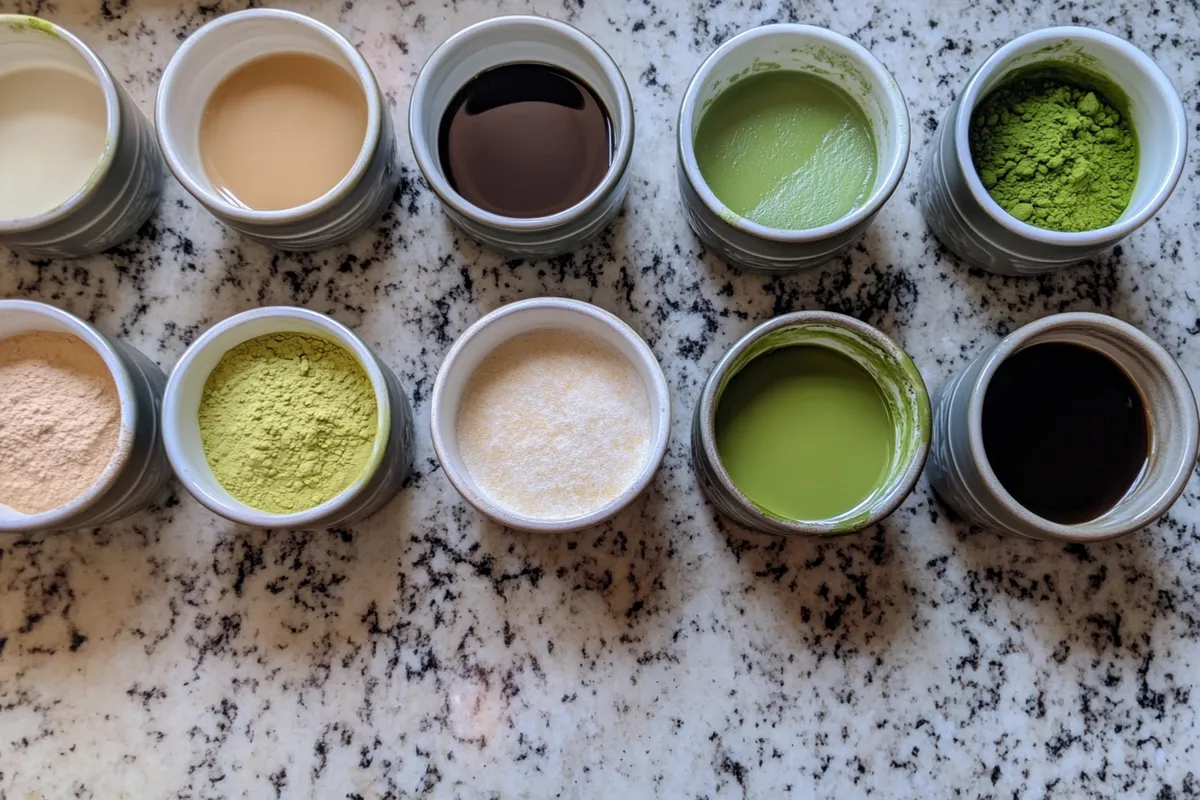
Taste Preferences
Your preferred sweetness plays a big role in choosing the right sweetener for matcha. Matcha’s flavor blends earthy, grassy, and umami notes. Some find this profile appealing, while others prefer a sweeter touch. If you like a richer sweetness, try maple syrup or honey. These add a deep, complex flavor that pairs well with matcha’s earthiness.
If you want something lighter, stevia or monk fruit might work better. These zero-calorie sweeteners are very strong, so you only need a little. They add sweetness without overpowering matcha’s natural taste.
Your taste preferences matter most when picking a sweetener. Do you prefer a sweeter, bolder drink or the natural matcha flavor? Understanding what you enjoy helps create the perfect cup that suits your palate.
Health and Dietary Considerations
Your diet and health needs play a big role in choosing the right sweetener for your matcha. If you follow a keto or low-carb diet, avoid regular sugar. It’s high in carbs and spikes blood sugar. Instead, try stevia, erythritol, or monk fruit. These sweeteners have no net carbs and won’t affect blood sugar.
For vegans or those on plant-based diets, pick sweeteners that align with your values. Honey, though natural, isn’t vegan. Agave syrup or maple syrup are great alternatives. If you’re gluten-free or dairy-free, check for hidden allergens or animal-based ingredients.
Your dietary needs will guide your choice. Whether avoiding sugar, sticking to a diet, or looking for a healthier option, the right sweetener supports your goals and enhances matcha’s flavor.
Flavor Pairing with Matcha
Choosing the right sweetener starts with matching flavors. Matcha’s earthy and slightly bitter taste works best with certain sweeteners.
Maple syrup has a rich, caramel flavor that blends beautifully with matcha. It adds sweetness without covering matcha’s unique taste. Honey, on the other hand, provides a mild floral sweetness. It pairs well with matcha’s grassy undertones for a balanced flavor.
Stevia and monk fruit are lighter, neutral options. They sweeten matcha without changing its natural flavor. These are great if you want to keep matcha’s taste as it is.
For bolder choices, coconut sugar adds a molasses-like depth. This makes matcha richer and more complex. Agave syrup offers a gentler sweetness. It works well in cold matcha drinks or smoothies.
Finding the best sweetener is about balance. Whether you prefer rich maple syrup or subtle stevia, the goal is harmony with matcha’s earthy profile.
Environmental Impact and Sustainability
Sustainability is another important factor to consider when selecting a sweetener. As eco-friendly sweeteners become more popular, it’s crucial to think about the environmental impact of the sweetener you choose.
Agave syrup, for instance, has been criticized for its sustainability issues. The agave plant, which is used to produce the syrup, requires a lot of water to grow, which can strain local water resources. Additionally, the production of agave syrup has been linked to certain environmental concerns. However, it remains a popular choice due to its low glycemic index and natural sweetness.
Maple syrup, on the other hand, is generally considered a more sustainable option, especially if you choose organic varieties. Maple trees are tapped for sap, and the process of making syrup is relatively eco-friendly compared to other forms of agriculture. Coconut sugar is another sustainable choice, as the coconut tree requires fewer resources to grow than other types of sugar crops. Furthermore, it’s often harvested in ways that support the local communities who rely on coconut trees for their livelihoods.
In conclusion, when making your decision, consider how your sweetener affects the environment. Opt for sustainable sweeteners that are produced with minimal environmental impact, and look for certifications like organic or fair trade to ensure that your choice benefits both your health and the planet.
When choosing the best sweetener for your matcha, it’s important to think beyond just taste. Consider your health goals, dietary preferences, and sustainability concerns to make an informed choice that aligns with both your lifestyle and values. Whether you’re seeking a healthier option, a cleaner flavor, or a more eco-conscious choice, the sweetener you select can transform your matcha experience into something truly personal.
FAQs (Frequently Asked Questions)
What is the healthiest sweetener for matcha?
The healthiest sweeteners for matcha are natural, low-glycemic options like stevia, monk fruit, and maple syrup. These sweeteners provide sweetness without significant calories or blood sugar spikes. Raw honey is also a good choice, offering antioxidants and other health benefits. The key is choosing a sweetener that aligns with your health goals, whether you’re looking to control blood sugar or reduce calorie intake.
Can I use sugar in my matcha?
Yes, you can use regular sugar in matcha, but it may not be the healthiest option. Sugar can cause blood sugar spikes and lead to energy crashes. If you prefer the taste of sugar, consider using less refined alternatives like coconut sugar or maple syrup, which offer more nutrients and a lower glycemic index.
What sweeteners should I avoid in matcha?
It’s best to avoid overly processed artificial sweeteners like aspartame and sucralose, as they may alter the taste and come with health concerns, especially if used in excess. These sweeteners can also leave an aftertaste that can overpower matcha’s natural flavor.
Are artificial sweeteners good for matcha?
Artificial sweeteners can be used in matcha for those looking to cut calories or sugar, but they are often less ideal due to their aftertaste and potential health concerns. If you choose artificial sweeteners, consider options like monk fruit or stevia, which are naturally derived and have minimal impact on blood sugar.
Can I use stevia in matcha?
Yes, stevia is an excellent choice for sweetening matcha. It’s a zero-calorie, natural sweetener that won’t affect blood sugar levels, making it ideal for those on low-carb or keto diets. Just use it sparingly, as stevia is much sweeter than regular sugar.
Is matcha better with maple syrup or honey?
Both maple syrup and honey are great options, but it depends on your taste preferences. Maple syrup offers a rich, caramel-like flavor that pairs well with matcha’s earthiness, while honey provides a lighter, floral sweetness. If you prefer a deeper, more robust flavor, maple syrup is the way to go.
How do you sweeten matcha tea?
To sweeten matcha tea, simply add your preferred sweetener—whether it’s stevia, maple syrup, honey, or agave syrup—into the prepared matcha. Stir well to ensure the sweetener dissolves completely. You can also experiment with different sweeteners to find the one that complements matcha’s flavor best.
What does Starbucks use to sweeten matcha?
Starbucks typically uses classic syrup (a type of simple syrup made with sugar) to sweeten their matcha lattes. However, you can customize your drink by asking for a lower-calorie sweetener or opting for alternatives like honey or stevia. Be sure to ask for adjustments to match your health goals and flavor preferences.
Conclusion: What Sweetener Is Best for Matcha?
Choosing the right sweetener for matcha is about more than just sweetness—it’s about taste and health. Natural options like honey, maple syrup, and stevia not only enhance matcha’s earthy flavors but also provide benefits like antioxidants and blood sugar support. Low-calorie choices such as stevia or erythritol are ideal for those managing weight or blood sugar without giving up flavor.
Your dietary needs also play a big role. Whether you’re following keto, vegan, or low-carb diets, there’s a sweetener that works for you. Understanding your taste preferences—like the rich sweetness of maple syrup or the light touch of stevia—ensures every matcha experience feels just right.
Ultimately, the best sweetener for your matcha is one that aligns with both your taste and health goals. By experimenting with different options, you can find the ideal match that elevates your matcha while supporting your overall wellness. Enjoy your matcha journey and sip away, knowing you’ve chosen the perfect sweetener to suit your lifestyle.

